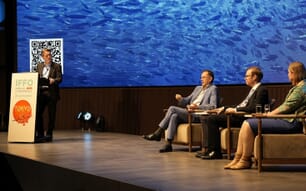
© FAO, Carlos Diaz
Twenty-two countries and the European Union advanced their commitment to sustainable fisheries and aquaculture during the forty-eighth session of the GFCM. The meeting, hosted by Spain in Málaga, was opened by Luis Planas, minister of agriculture, fisheries and food of Spain, Costas Kadis, European commissioner for fisheries and oceans of the European Commission, Francisco de la Torre Prados, mayor of Málaga and Roland Kristo, chairperson of the GFCM.
As the regional body in charge of managing fisheries and aquaculture in the Mediterranean and the Black Sea, the GFCM reviewed proposals for recommendations and resolutions based on the best available scientific advice.
“The GFCM session symbolises the union between two sister seas that share history, culture and life, and represents an opportunity to move towards sustainable fisheries and aquaculture,” said Planas. He called for “cooperation between states to secure the future of fisheries and fishing communities, in which profitability and sustainability must go hand in hand.”.
Strengthening compliance to combat illegal, unreported and unregulated fishing
This year’s session saw the reinforcement of mechanisms to bolster compliance with GFCM decisions. The Commission agreed on a new system that will improve the assessment of data reporting and monitoring, control and surveillance (MCS) obligations. This will help identify gaps and provide targeted support – ranging from technical assistance to stricter vessel monitoring requirements.
The GFCM also advanced MCS measures by enhancing the voluntary exchange of vessel monitoring data and requiring all vessels over 20 metres operating beyond national waters to hold an International Maritime Organization number, improving traceability.
Albania, Algeria, Egypt, the European Union and its Member States, Montenegro, Morocco and Türkiye all maintained Compliance category one, confirming a strong regional commitment to data reporting and alignment with GFCM rules.
Advancing sustainable aquaculture
The Commission highlighted major progress in advancing sustainable aquaculture, praising stronger governance and scientific collaboration under the reformed Scientific Committee on Aquaculture, as well as improved coordination among its Technical Advisory Groups, and Information System for the Promotion of Aquaculture in the Mediterranean. This collaborative framework, also underpinned by the success of the Aquaculture Demonstration Centres in sharing knowledge across the region, continues to foster participatory, data-driven decision-making in the sector.
Building on the outcomes of the 2024 Regional Aquaculture Conference, the Commission welcomed the shared regional vision for sustainability under the upcoming MedFish4Ever Declaration and emphasised the need for continued cooperation with farmers’ associations.
Two key resolutions were adopted to enhance environmental sustainability: a harmonised environmental monitoring programme and an initiative aimed at establishing aquaculture zones for restoration, both promoting ecosystem health and resilience.

© IRTA
Ukraine: from successful cooperation to full membership
The Commission warmly welcomed Ukraine as its twenty-fourth contracting party, marking a significant step forward in regional cooperation in the Black Sea.
“This is a historic moment for Ukraine. Full participation in the work of the GFCM opens up new opportunities for the development of fisheries, aquaculture and the conservation of marine ecosystems of the Black Sea. We are ready to actively participate in the implementation of the GFCM's mission – the effective management of bioresources and support for the sustainable development of coastal communities,” said Taras Vysotsky, deputy minister of economy, environment and agriculture of Ukraine, in a press release.
Since 2015, Ukraine had been a cooperating non-contracting party of the GFCM, contributing significantly to regional fisheries initiatives for assessing and restoring Black Sea commercial stocks. It supported sustainable aquaculture through capacity-development programmes, joined regional dialogues to strengthen MCS and aligned national legislation with GFCM standards.
New GFCM Bureau
The GFCM appointed a new Bureau for a four-year mandate, with Eyüp Mümtaz Tiraşin (Türkiye) as chairperson, Francesco Saverio Abate (Italy) as first vice-chairperson and Saber Alazabi (Libya) as second vice-chairperson.
“Since 2018, together, we have laid the foundations for long-term sustainability in our region, we’ve deepened our scientific base, and we’ve shown that this Commission can be both a technical and political force for good,” reflected outgoing Chairperson Roland Kristo. “The GFCM is strong, focused, and ready for what’s next. I know the incoming Bureau will continue to lead with vision and determination.”
The FAO has published the full story and its recommendations on its official webpage.




